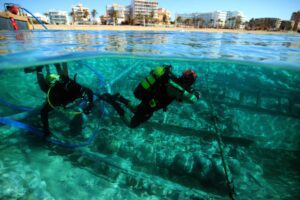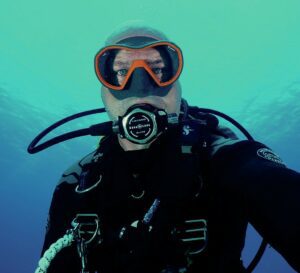Q: Hello. I have been diving for 57 years, and I am an advanced diver and ex-instructor. I was recently diagnosed with atrial flutter and had a procedure to try to stop it. Unfortunately, this did not work and I now have atrial fibrillation. This is being kept under control with bisoprolol and apixaban. My specialist (who is not a diving doctor) has said he may do another operation, but has also said staying on the drugs may be sufficient. Basically, I would like to know if I can still dive when on these drugs. I have no obvious side-effects from them, or from the atrial fibrillation. What is your recommendation?
A: This is an interesting question. Atrial fibrillation or AF is a condition where the heart beat becomes irregular, but in an irregular sort of way. Unsurprisingly, doctors describe the rhythm as ‘irregularly irregular’. The problem with this is that the upper chambers of the heart (the atria) don’t contract in a co-ordinated fashion, and the blood in them can pool and clot, which is a risk factor for a stroke. It also means the heart can weaken, leading to heart failure, where the heart muscle cannot pump effectively enough to meet the body’s needs. Diagnosing AF is easy, but what is harder is finding out why this has happened. It can be due to all sorts of things: coronary artery disease, high blood pressure, valve problems in the heart, thyroid disorders, infections, sleep apnoea, and excesses of stimulants such as caffeine, alcohol or tobacco. So it is important that your cardiologist has excluded all the correctible causes of this problem.
If no cause is found, then it is known as ‘lone atrial fibrillation’, as it can occur with increasing age on its own. There are issues with both the medications you are on and diving, I’m afraid. Beta blockers (such as bisoprolol) are often prescribed to slow the heart rate down, but they can restrict your lung function and impair your response to exercise, both of which could be dangerous underwater. An anticoagulant is also often recommended, such as the apixaban you are taking, to reduce the risk of clot formation and stroke. However, some diving doctors are concerned that these could lead to a higher chance of bleeding, into the middle ear, for example; or worse, into the spinal cord if you were unlucky enough to get spinal decompression illness.
So there’s a bit of thought, discussion and work to be done before you get back into the water, I’m afraid. I don’t think you need to give up diving right away, but I do think you need to see an experienced diving doctor to discuss all the issues I’ve brought up. They would certainly want to check your heart function, lung function, and exercise capacity. You may need to get these heart tests done by your cardiologist first, if you’ve not had them already. Best of luck!
Q: My husband and I are both keen divers and our daughter is showing an interest already, even though she’s only five. She’s been quite unlucky with ear infections though, and the ENT doctors are recommending she has grommets to stop her getting them so often. Obviously, we are going to do what’s best for her, but will this stop her diving before she’s even started?
A: Grommets are tiny tubes inserted into the eardrum. Smaller than a match head, they’re used to create an artificial perforation so that air can pass into the middle ear, and more importantly, mucus and pus can get out. The simple reasoning is this: the pain and misery of middle ear infections is mostly due to the pressure created by all that infectious gunk building up in a confined space. Put a hole in one of the walls of this confined space, and the pressure won’t be able to build up – hence no pain, fewer infections and a happy kid. And it works.
The grommets eventually fall out by themselves after a while (it takes a few months to a few years) and the perforation left behind heals up by itself. By that stage the child is older and bigger and hopefully has grown out of infections, so quite a neat procedure all round. Luckily, once the eardrum has healed, it’s perfectly safe to dive with (although it will always be slightly more fragile than an undamaged one). So there’s no need to mourn the loss of your daughter’s diving career just yet.
Image: Stock photo by Photo by Sebastian Pena Lambarri
Also do read if you Can scuba dive with a false front tooth?







